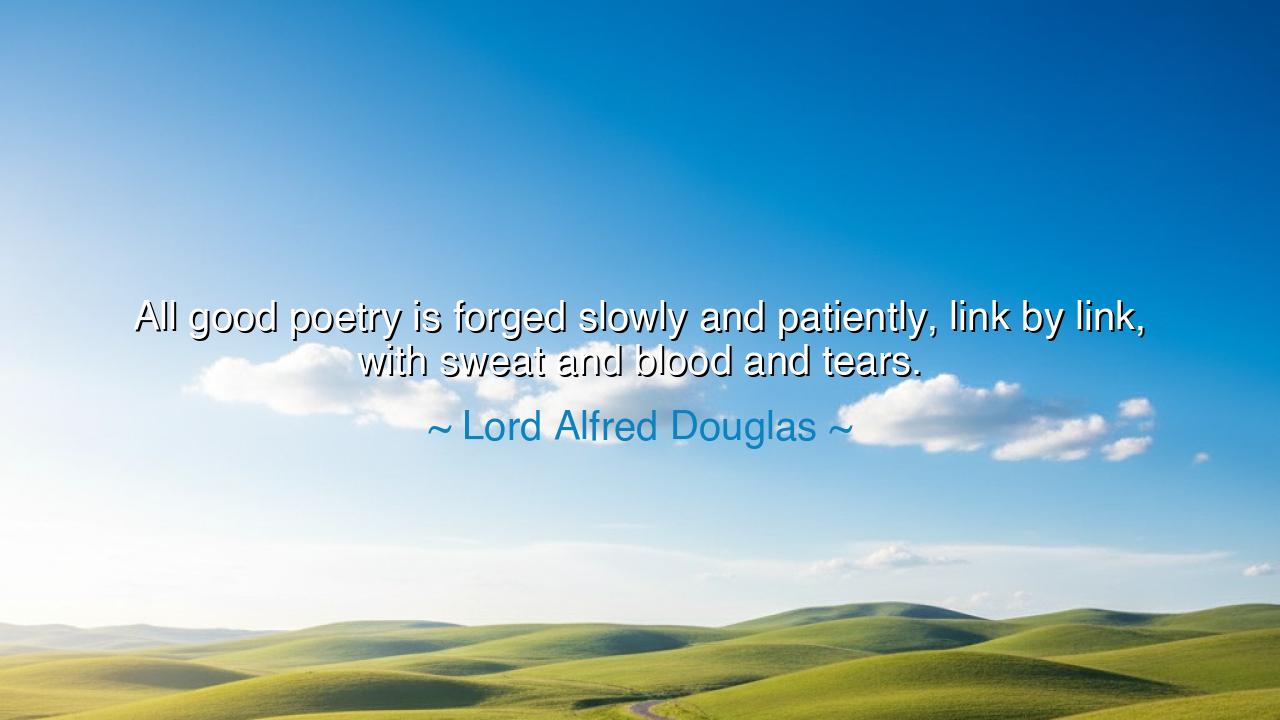
All good poetry is forged slowly and patiently, link by link
All good poetry is forged slowly and patiently, link by link, with sweat and blood and tears.






Hear, O lovers of truth and beauty, the voice of Lord Alfred Douglas, who declared: “All good poetry is forged slowly and patiently, link by link, with sweat and blood and tears.” In these words he reveals that poetry, though it may appear as effortless song, is born not of ease but of labor, not of sudden inspiration alone but of the long struggle of the spirit. A true poem is not a passing breeze—it is a chain hammered in the fires of the heart, each word a link tested in flame, cooled in sorrow, strengthened by endurance.
For the poet, like the blacksmith, must bend and shape raw matter into lasting form. Ideas, images, and emotions are but molten ore, and it is only through repeated blows of craft and revision that they become solid. The poet sweats in the effort, sheds tears in despair and longing, and pours blood into the wounds of experience. The finished poem, shining and strong, conceals this labor, but within its lines lies the record of a soul’s struggle for expression.
Consider the life of John Milton, who labored for years on Paradise Lost, blind and in pain, dictating his verse to others when his own sight failed. Each line was carved from the depths of suffering and the heights of vision. His was no hurried work, but the patient forging of a lifetime, hammered by trial. The result is not merely poetry but an eternal monument, a chain of words so strong it has endured centuries. Truly, Milton’s work embodies Douglas’s truth: good poetry is forged with patience and with sacrifice.
Even Emily Dickinson, whose poems seem like flashes of lightning, labored endlessly in her solitude, revising, refining, compressing her language until each word carried the weight of eternity. Behind the brevity of her lines lies the painstaking work of condensation, of searching for the precise word, the perfect rhythm. The sweat and tears of her inner battle are invisible, but they gave her small fragments the power of thunder.
Douglas himself, though remembered for his tumultuous life with Oscar Wilde, knew that poetry was no escape from suffering but a transformation of it. His words about sweat, blood, and tears were born from the recognition that art does not spring whole from the mind like Athena from Zeus’s head, but is wrestled into existence through the storms of experience. It is life’s pain transfigured into beauty, its anguish hammered into strength.
This truth applies not only to poetry, but to all creative and noble endeavors. The builder of cathedrals, the sculptor of marble, the composer of symphonies—all must endure the same slow forging, the same exhaustion of body and heart. What is true of art is also true of the spirit: character, too, is formed link by link, through trials, through patient endurance, through sweat and sacrifice.
Therefore, O seekers of meaning, take this lesson to heart: do not despise the labor, nor be dismayed by the slowness of your progress. If your words come haltingly, if your efforts seem fruitless, remember Douglas’s wisdom: good poetry—and good living—is not made swiftly but forged over time. Honor the sweat, accept the tears, and let even your wounds pour into your work, for from them will come strength.
So remember: all good poetry is forged slowly, link by link, with sweat and blood and tears. Let this be your guide not only in writing but in life itself. For what is a life well-lived if not a poem forged in patience, hammered in trial, and shining at last with the radiance of the soul? Endure the forging, and you will create what endures.






TDHieu Truong Dinh
There’s something heroic about this view of poetry, as if the poet is a laborer of the soul. Douglas seems to suggest that time and endurance are what make writing meaningful. I admire that dedication, but part of me wonders if this idea excludes those who write intuitively, without such visible struggle. Maybe good poetry can come from both—pain and ease, persistence and grace.
BDBa Dung
This line makes me think of poetry as craftsmanship rather than pure inspiration. The imagery of forging ‘link by link’ feels almost blacksmith-like—each word shaped under heat and pressure. I like that it acknowledges the poet’s humanity, the sweat and tears behind beauty. Still, I’m curious—does emphasizing struggle risk romanticizing suffering as a requirement for art?
MTDo Hoang Minh Thien
I find this statement both inspiring and intimidating. It honors the discipline behind poetry but also makes it sound like an ordeal. Maybe that’s the point—real art demands total commitment. But I also wonder if there’s room for spontaneity in such a vision. Can something written in a sudden burst of emotion still be considered ‘good’ if it wasn’t forged slowly?
CMnguyen cong minh
This quote resonates deeply with me because it strips away the illusion that poetry is effortless inspiration. Douglas reminds us that art is labor—emotional, intellectual, and even physical. It makes me think of poets revising the same line for years, wrestling with meaning until it feels true. I wonder if the struggle itself is what gives poetry its depth. Can something born easily ever carry the same weight?